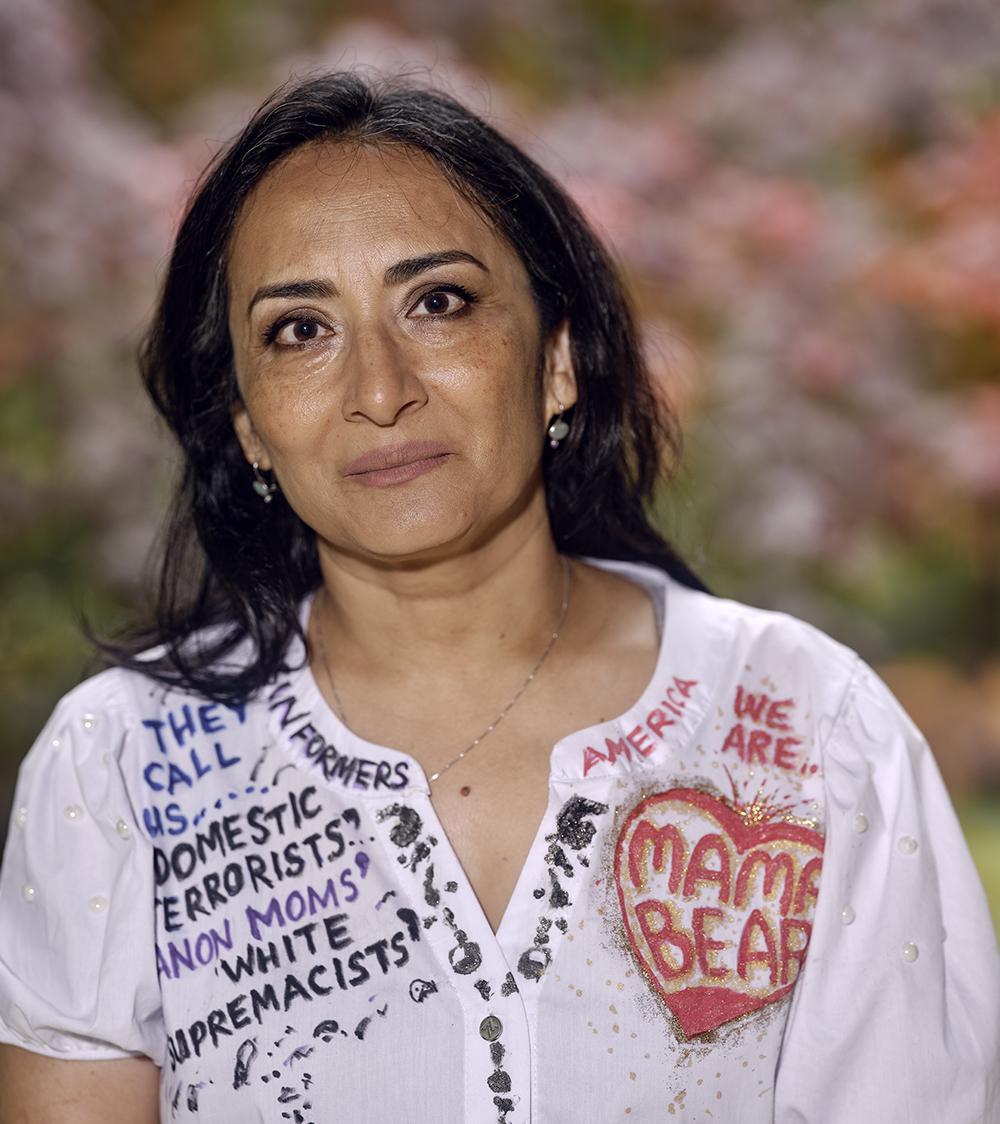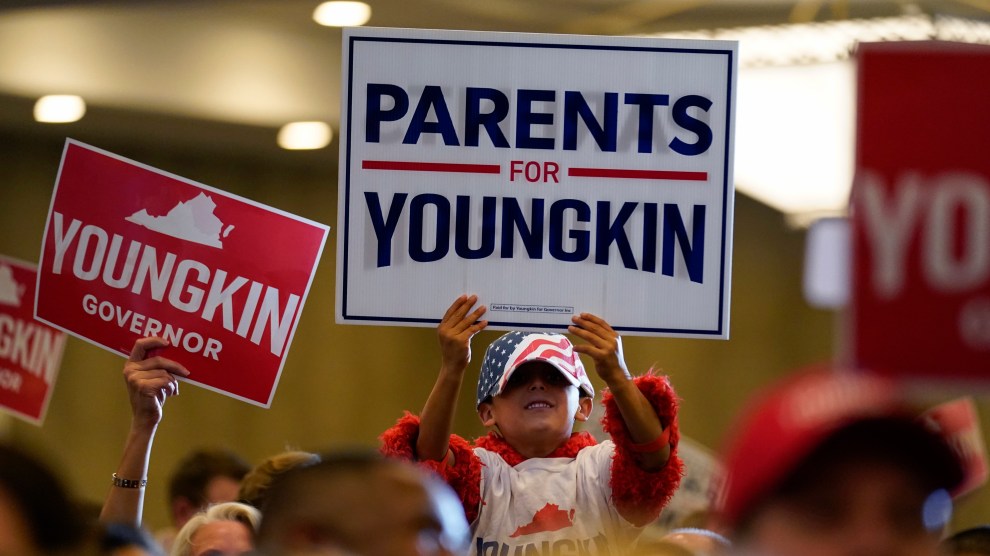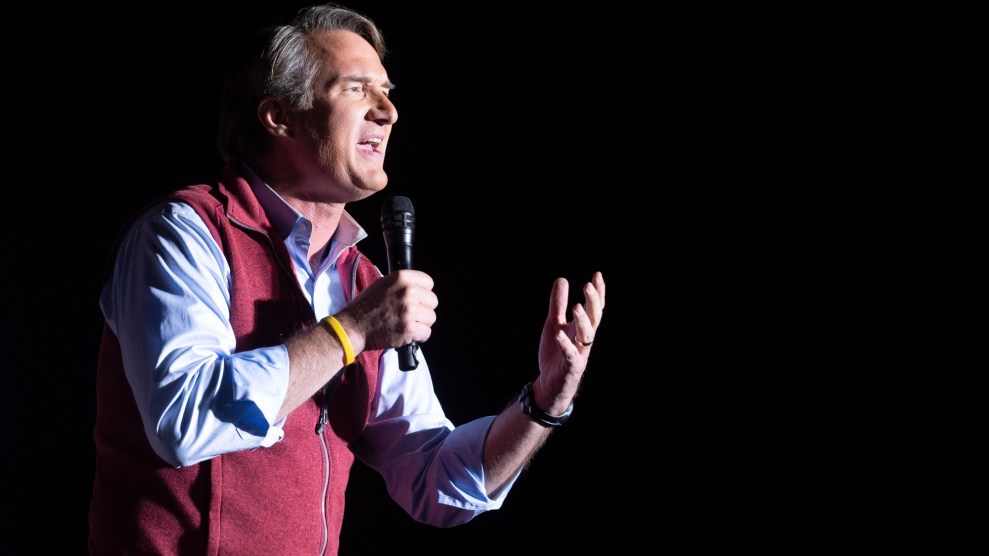On a chilly, overcast afternoon in early March, a dozen riled-up parents gathered outside a Fairfax County, Virginia, school board meeting, holding “Stop Asian Hate” and “UnFairfax” signs. They were protesting a controversial reworking of admissions policies that had dramatically changed the racial composition of Thomas Jefferson High School for Science and Technology, one of the country’s top magnet schools. Heading the rally, clad in a snake print dress and black boots, was Asra Nomani, a 5-foot-tall, Indian-born Muslim mother of a 19-year-old TJ alum. Nomani is the co-founder of Coalition for TJ, a parent-led organization that sued the board over its admissions overhaul, which had reduced the freshman student body from 73 percent Asian in 2020 to 54 percent the following year.
“How many of you came here for the American Dream?” Nomani asked, leading fellow immigrants in “recall school board” chants. “Are they the darkness that has set upon Fairfax?” she continued, eliciting a chorus of approval. “We are the light, and our children are the light! We are unapologetic, are we not?” Then Nomani offered a vision for the future. “We’re going to move until this goes to the Supreme Court if it needs to go. We will win not just for our children, not just for the state of Virginia, but for America.”
A former Wall Street Journal reporter who calls herself a liberal feminist, Nomani has become the face of what she describes as “hopping mad” parents in Virginia, and a central figure in the education culture wars. Christopher Rufo, the Manhattan Institute fellow who helped launch the nationwide assault on critical race theory (CRT)—an academic framework whose political fight has become a conservative bogeyman—told me Nomani is a “hero for education.” “She demonstrated remarkably effective strategies and tactics in Fairfax County, which can now be deployed across the nation,” he wrote in an email. “Parents are revolting against critical race theory and Asra Nomani has demonstrated the courage and intelligence to win the fight.”
A skillful communicator with a penchant for media appearances rich in props, she’s been repeatedly welcomed on Fox News and other conservative outlets to decry CRT as divisive state-sponsored indoctrination. She sometimes does a show-and-tell of the latest books that have drawn conservative backlash—say, Ibram X. Kendi’s Antiracist Baby or Maia Kobabe’s Gender Queer—while accusing Democrats, the mainstream media, and school administrators of gaslighting and silencing parents. Until March, she was a vice president at Parents Defending Education (PDE), a national organization whose stated goal is to build an “army of parents to begin reclaiming our K-12 schools from political activists and extremists.”
Despite being a lifelong Democrat, Nomani voted for Donald Trump in 2016 and has been credited with helping elect Republican Gov. Glenn Youngkin; whose early outreach to Coalition for TJ parents set in motion what a campaign consultant called his “offense on education.” At his election night party, Nomani recorded a video of Youngkin spotting her sparkly “mama bear movement” T-shirt and saying he had been watching her on TV all evening. “You were great,” he said, followed by a hearty “Way to go, mama bears! You guys were awesome.”
How did Nomani manage to galvanize parents who, as one involved mother put it, hadn’t previously had a “bone of activism in their bodies”? Frustration over pandemic school closures certainly helped. But Nomani rebranded a cacophony of tangentially related grievances—sexual content in school libraries, CRT, the rollback of gifted and talented programs—into what she calls a new system of racism, which casts Asians as a “wrong kind of minority” and challenges deeply held values of merit and equality. Calling herself a liberal Muslim woman of color championing justice only increases her appeal to white Republicans who share some of her goals, and who want protection against being labeled racists. Together, they aim to build what one GOP strategist called the “biggest block of single-issue voters in the history of American politics”: parents. “We’re going to guide this country,” Nomani told Laura Ingraham in November, warning that Democrats would lose more races if they continue to treat parents “like dirt.”
“As a liberal, I am shocked that so-called progressives accept regressive notions like segregated affinity groups, targeted discrimination against Asian students, and a new hierarchy of human value that scores people by their privilege in an oppression matrix,” she wrote me. “I am always stunned when people refuse transcendent values of humanity to press sectarianism, bigotry, and separation.”
When faced with Thomas Jefferson’s new admissions policy, angry Fairfax parents did what many do: They took the school board to court, represented by Pacific Legal Foundation, a libertarian law firm with a track record of fighting affirmative action and challenging elite public high school admission policies that have resulted in fewer Asian American students. The school defended its new system, which replaced standardized tests with a more holistic assessment that would reflect the community’s demographics. But on February 25, a federal judge appointed by Ronald Reagan ruled that the new process discriminated against Asian Americans. Parents like Nomani celebrated since they considered the school’s equity effort to be a deliberate “racially-engineered” attack on their families and a war on merit. This was just another example of the erosion of parental rights and the greater threat of “wokism” and leftist ideologies permeating public education across the country in the wake of racial justice movements.
The board appealed the court’s ruling, obtaining a stay that allows the plan to remain in place through litigation. In April, Coalition for TJ filed an emergency request with the Supreme Court to block the policy. But on April 25, the court declined to intervene. The case could still make its way back to the justices, who, this fall, are set to hear two cases challenging race-conscious college admission policies where the plaintiffs also claim discrimination against Asian Americans, to weigh in on the merits.
“This case is important because it’s really challenging the ability of schools to consider the goals and the values of diversity and school integration at a very basic level,” says Sarah Hinger, a senior staff attorney with the ACLU’s Racial Justice Program. “It could have far-reaching impact on the ways schools consider equity and it could extend even beyond race and schools.”
“They delayed justice for us,” Nomani told me, complaining of the board’s decision to fight on. “I see ourselves as the civil rights activists of the day. Our Coalition for TJ is the Brown v. Board of Education case for the 21st century.”
While Nomani brands herself a typical PTA mom turned accidental activist, she is hardly a novice crusader. She entered the spotlight by positioning herself as a Muslim critic of increasingly radicalized Islam—another time she felt she was waging battle with progressive censors. Born into a conservative Muslim family in 1965 in what was then Bombay, Nomani moved to the United States when she was 4. Within six years, her family had relocated to predominantly white Morgantown, West Virginia, where her father helped to found a mosque. For Nomani, her parents epitomized the American Dream: hardworking immigrants who had lived through British colonial rule and, based on merit alone, managed to thrive in a foreign land—her father as a nutrition scholar and her mother as the owner of a small clothing boutique.
In her 2005 autobiography, Standing Alone in Mecca, Nomani recounts a double life, struggling to abide by Islamic standards—not attending dances, dating, or wearing tank tops—while still assimilating into Morgantown’s dominant culture by reading Nancy Drew and Little Women, and running cross-country. As a West Virginia University student, she moved to New York to intern at Harper’s Magazine and, at 23, landed a job at the Wall Street Journal, where she would work for 15 years.
Nomani aspired to be a war correspondent but instead made a name for herself with trendy zeitgeist pieces—on in-flight sexual misconduct or how the thong became the under apparel of choice of many American women. An interviewer joked she’d become the paper’s sex reporter. In 2000, Nomani took leave to travel to India to work on a religious identity memoir that grew from a reporting assignment on the fad of Tantric sex. But the brutal 2002 murder of her colleague Daniel Pearl by Pakistani terrorists irrevocably changed her life. (In 2007, she started the Pearl Project at Georgetown University, a journalistic endeavor that began as an investigation into his murder and has since been repurposed to denounce anti-Semitism.) Four weeks after his disappearance, she learned she was pregnant by a partner who had left her. She retreated to Morgantown and, in 2003, made a pilgrimage to Mecca with her family. She left Saudi Arabia “vowing to throw whatever stones I could at the forces of darkness in the world,” she writes in the autobiography, specifically meaning Islamic fundamentalism.
The mosque that her father helped found became her first battleground. She challenged its rules about separate prayer and entrances for men and women, leading the New York Times to highlight her “Rosa Parks-style civil disobedience”—35 members signed a petition to ban her. Nomani then wrote an “Islamic Bill of Rights for Women in the Bedroom,” which included the “right to respectful and pleasurable sexual experience.” In 2005, she went on a nationwide “Muslim Women’s Freedom Tour” and organized a mixed-gender service led by a woman imam in New York City. Talk show host and comedian Bill Maher, who has expressed anti-Islam views, called her a hero.
But her confrontational tactics—from posting “99 precepts for opening hearts, minds and doors in the Muslim world” at the mosque’s entrance, to bringing in camera crews—did not sit well with some Muslim Americans, who considered her a publicity-seeking opportunist who enabled anti-Muslim bigotry by calling on women not to wear a hijab, serving as a witness in “witch hunt” congressional hearings, and supporting policies singling out Muslims. Nomani has dismissed such criticism as character assassination and an attempt to quash dissent.
She has also been called epithets like “‘native informant,’ perpetuating certain stereotypes and problematic ideas about her own community,” says Sabiha Mohyuddin, a graduate student at UC Santa Barbara’s Department of Sociology. Mohyuddin, who studies race and identity with a focus on South Asia, says Nomani’s views on Islam are harmful. “She’ll use the language of feminism or even her intersectionality to justify very right-wing reactionary policy.”
Christine Fair, a professor at Georgetown who was formally accused of harassment by Nomani after Fair called her out on Twitter for voting for Trump, has a harsh verdict: “She’s essentially an arsonist who claims to be a fireperson.”
“Her commentary is irrelevant to me,” Nomani responded.

In June 2020, when her son was a junior at TJ, the principal sent an email about the school’s lack of diversity, urging parents to “think of privileges you hold that others may not.” Nomani describes that message and the subsequent admissions changes like a “knife in my heart.” She began networking with other parents and launched a Substack newsletter in which she publishes the results of public records requests for school contracts with speakers and equity-and-diversity consultancy firms—a multimillion-dollar “woke-industrial complex,” she claims. (On LinkedIn, Nomani brands herself as, among other things, a “private investigator” experienced in unraveling secrets.) Harry Jackson, a Coalition for TJ co-founder and parent advocate with PDE, says, “A lot of people ask her to run for office, but she likes what she’s doing.”
“These so-called moms are communication professionals, always very savvy politically,” says Maurice Cunningham, a retired University of Massachusetts, Boston, political science professor and the author of Dark Money and the Politics of School Privatization. Organizations like Parents Defending Education, he adds, may appear to be grassroots groups but can be fueled by big right-wing money. While PDE doesn’t disclose its funding sources, its president previously ran the Independent Women’s Forum (IWF) and Speech First, both Koch-backed organizations.
“She has the guts to speak up,” says Alice Guo, a parent at the March Fairfax County protest. Our conversation was interrupted by a GOP campaign manager and a Republican candidate for Congress likely eager to tap into the hot-button political issue ahead of the midterms. “That woman, she’s unstoppable.”
At that night’s school board meeting, Nomani took the mic for a fiery speech that again likened her cause to the civil rights movement. “For the last two years you have been trying to make us invisible, but…you’re going to go down in history just like the school board in Brown v. Board,” she said. As shouts of “stunt” intensified, Nomani grew more agitated. Eventually, she became so heated she was escorted away from the microphone, as she accused security of trying to intimidate her, and school board members of being “the new face of racism.” The meeting was called into a brief recess, during which she continued to speak up. “You do not want our voices raised, do you?”
One sympathetic parent in attendance marveled to me that Nomani “has the power to suck all the oxygen out of the room.” Indeed, Nomani says she lost her job at PDE for her “inappropriate speech.” In an op-ed for the Federalist, where she is a senior contributor, Nomani said she was “unceremoniously” fired eight days after the school board meeting and “booted” from the company’s messaging groups within minutes. The organization did not respond to requests for comment. (She has since joined the IWF’s activism arm.)
The opinion piece published on May 18 also mentions this profile, which, Nomani wrote, she expected “to chronicle my journey from hero to zero—from politically correct activism as a Muslim feminist to a puppet master for ‘dark money,’ ‘right-wing’ parent advocates. Those are the kind of hits I got immersing in conservative politics over the past year, but it has never deterred me, because, as a fierce opponent of critical race theory, I am the same classic liberal I have been as a Muslim feminist.”
But slights seem only to fuel her. She recently appeared on Tucker Carlson’s show in a T-shirt that her father had hand-painted with phrases used against her and other parents—“disinformers,” “QAnon moms,” and “white supremacists.” Nomani says she’s being vilified by the same “illiberal progressives” for having supported Trump in 2016 and for speaking out against the rules at her mosque.
“We’re human beings,” she says. “They can call me a white supremacist, white adjacent, Uncle Tom, it doesn’t matter. We’re never going to give up.”
















